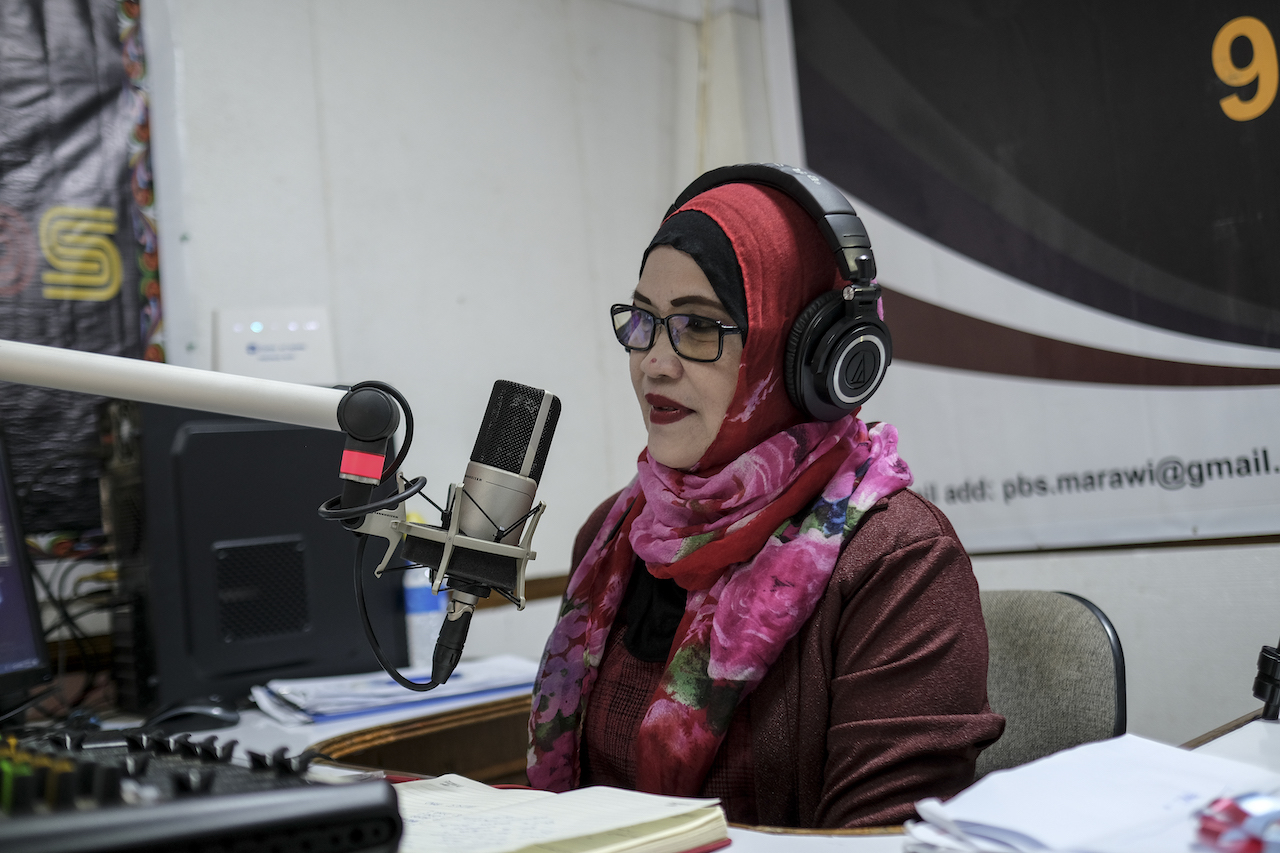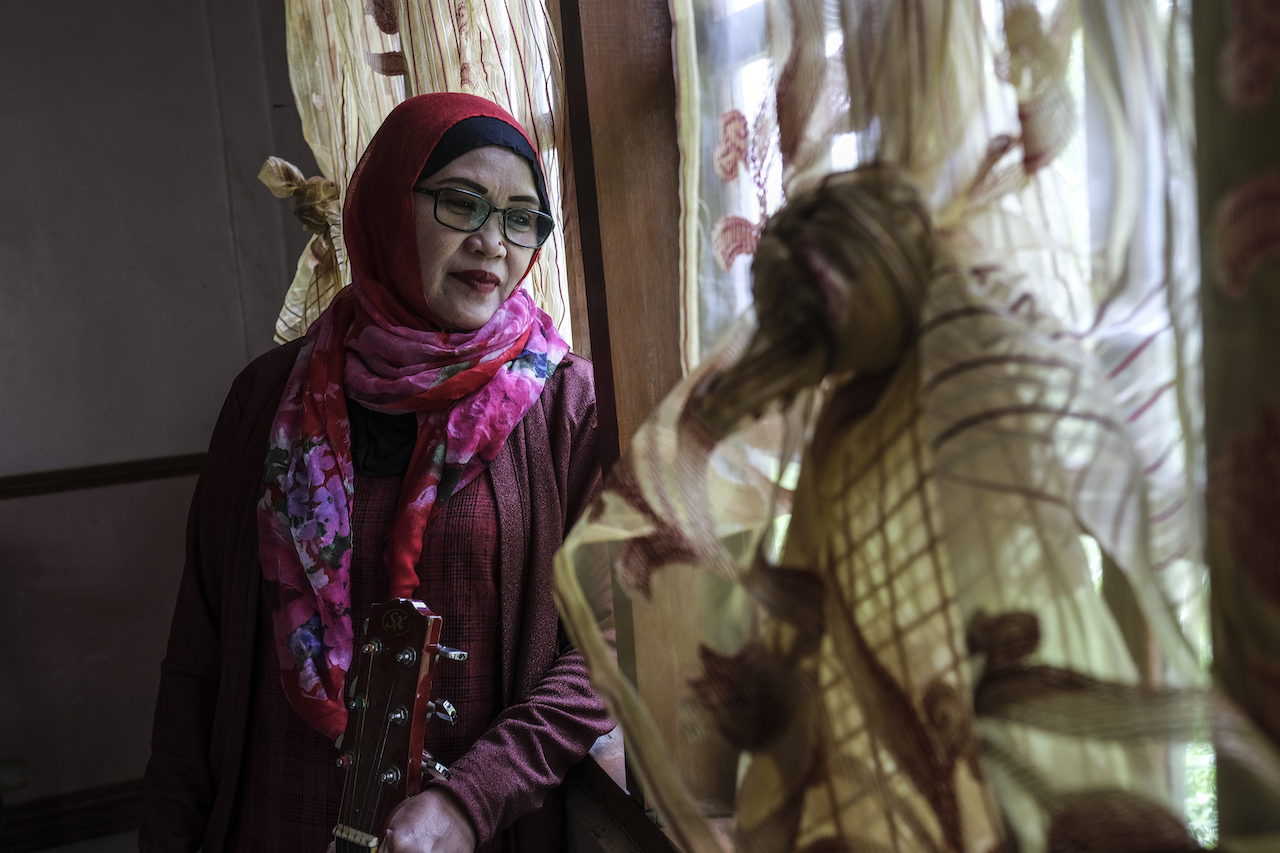Soraida Sarigala | Broadcaster

Hovering choppers around the city in the middle of the darkest night is an experience I could never forget.
Soraida Sabdullah Sarigala is a 50-year-old mother of nine children, whose ages range from 9 to 25. She holds the royal title Ba’i a Labi and is married to a sultan. As a traditional Meranaw leader, she has roles to play in the community: to be a model of proper behavior, a mediator, and an enforcer of customary laws and tradition.
But the role that keeps her busy most of the time is her job as acting station manager of DXSO Marawi of Radyo Pilipinas, the government broadcast network. She not only runs the station, she also anchors a daily radio program from 8 to 10 a.m. and acts as the station’s sole field reporter.
When the siege of Marawi happened in 2017, she found herself trying to hold the fort even when electricity and the water supply had been cut off over the entire city. It was only in the early morning of May 27, 2017, four days after ISIS-affiiated rebels battled with government forces for control of the city, that she finally joined the exodus out of Marawi, after family and friends kept pestering her to evacuate.
In her Facebook post of May 26, 2017, she wrote,
“When there’s no electricity, no water supply, no source of communication, celfon’s battery will be drained. And besides, families, friends and relatives are worried too much! Some are even crying while calling. What they want is our safety, no more no less!”
Because her house is located close to Mapandi Bridge right outside the perimeter of the main battleground, Sarigala and her family were within close range of the bombing and the firing.
“Ya Allah! Only you can stop this sound of bombs that have landed north and south and from east to west. Only you can give tawfiq or guidance to the people behind this scene. May their heart be enlightened. Hovering choppers around the city in the middle of the darkest night is such an experience that I could never forget. I could never forgive the people behind this, such a trembling feeling!, ” she continued.
Interviewed in her radio booth more than two years later, she said the memory of that period in her life and the life of Marawi City causes as much heartbreak as when it first happened.
When the airstrikes had started and it felt like the bombs were falling at the back of her house, she decided to leave even if it was 2 a.m. and the road out of Marawi was fraught with danger. At that time, she and her husband were the only ones remaining, since her children had gone on ahead and evacuated.
Sarigala and her family became evacuees, internally displaced persons, although not the stereotypical ones featured in media reports as inhabiting a tent inside a relocation site. They were home-based IDPs, those who sought shelter or were given refuge by relatives living outside the city. In fact, majority of the Marawi evacuees are home-based, since the Meranaw belief and practice of maratabat or pride dictates that relatives come to the aid of family members in need, to prevent shame and scandal from smearing the whole clan.
In Sarigala’s case, she took shelter in the home of her sister-in-law in Marantao, a town southwest of Marawi. It is from this house that she continued reporting by cellphone to the Manila headquarters of her broadcast network, PTV-4 and Radyo Pilipinas.
But the problem in Marantao is the poor internet connection. She had to climb to the second floor of the house, stand on a chair placed atop a table in search of a cellphone signal, to be able to send reports to Manila and to receive updates about the siege from her sources in the police and the military.
Being both a victim of a conflict and a reporter was a challenge for Sarigala. There were times when the sight and sounds of the city being bombed brought her to tears. But then her phone would ring, and it was Manila asking her to file a report.
“Ang ginagawa ko, pag umiiyak, tigil ka muna, kasi magfa-file ka ng report
(So I have to stop crying because I have to file my report),”
she said.
And then at the end of the five-month siege, she saw her home again during the military-sponsored visits called Kambisita that allowed Marawi residents to check on their houses briefly. “Nanghina ako nang makita ko ang bahay ko (I felt weak when I saw my house),” she said.

She compares the first and second visits. On the first visit, her furniture, appliances and decor seemed untouched. But by her second visit, everything was either in shambles or broken—washing machine, gas stove, computer.
Being the mother who knew exactly what was in her house, she found several items missing including clothing and the two-way radios that are a staple of Meranaw households, plus some items dear to a homemaker’s heart. “Ang nawala doon mga original na Tupperware, kasi box-box yan, may collection ako, yung iba hindi pa nagamit.”
For now, she puts all these heartaches aside to focus on the demanding job of running her radio station. She refuses to let the limitations of being a Ba’i a Labi restrain her, and goes where she is needed. She covers all activities of the Task Force Bangon Marawi, to keep the community of IDPs informed about what government is doing to address their plight. – Luz Rimban










